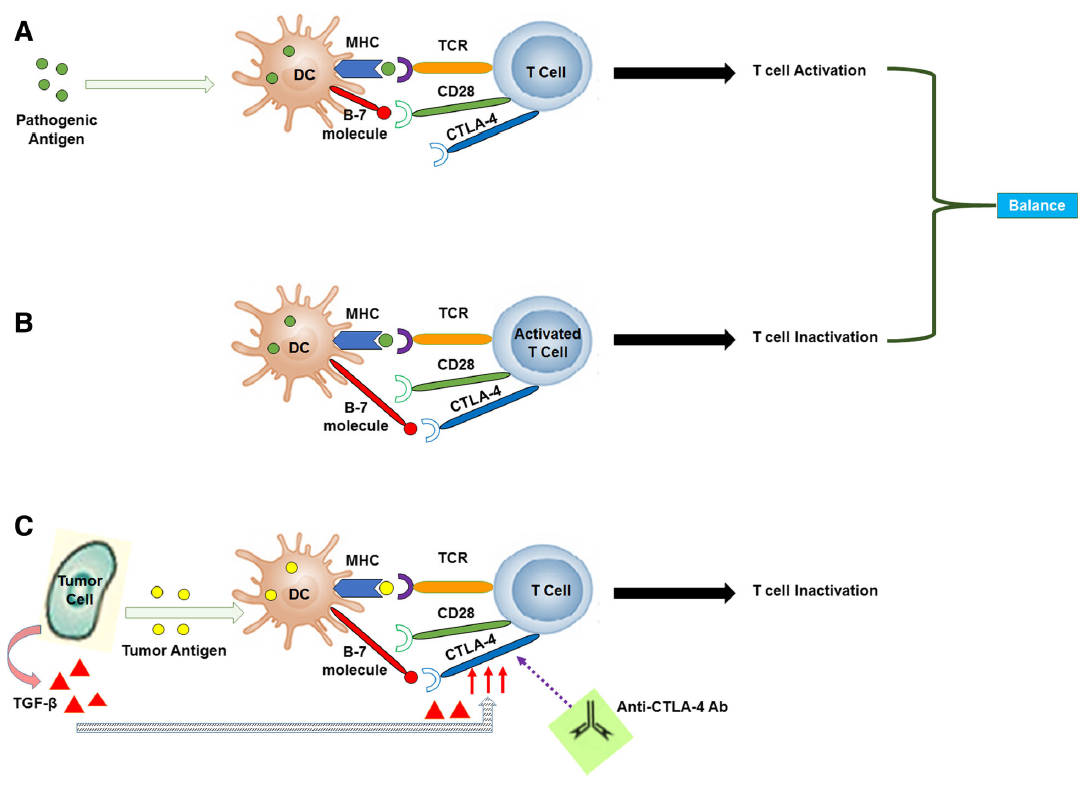With unrivaled expertise and extensive experiences in immunology, Creative Biolabs has developed an advanced T-Scan platform to help our clients accelerate their T cell research by providing end-to-end excellent services. We are dedicated to assisting our clients with the identification and characterization of functional antigens or targets recognized by T cells, systematic discovery of T cell epitopes.
As a critical role in adaptive immunity, T cells can recognize the specific antigens presented on antigen-presenting cells (APCs) and play helper or cytotoxicity functions to mediate protection from pathogens and cancers. Antigen is proteolyzed by the proteasome and loaded to the MHC molecule, then presented on the cell surface of APC. T cells are activated once TCR recognizes the peptide-MHC complex. CD8 positive T cells proliferate to cytotoxic T cells and kill the target cells with the same antigen. CD4 positive T cells proliferate to helper T cells and activate B cells with the same antigen. The activated B cells can proliferate to be plasma cells to produce antibodies (see Fig.1). When T cells recognize autoantigens, autoimmunity happens. Hence, understanding the T cell antigens or epitopes is necessary to help scientists explore the relationship between T cell antigens and human health. In addition, the identification of T cell epitopes provides strategic insights for immunotherapies.
 Fig.1 T cell activation and inactivation.1
Fig.1 T cell activation and inactivation.1
To discover novel antigens of TCRs from viral or human genome-wide libraries, our scientists developed an advanced T-Scan platform, a T cell-based, high-throughput screening approach to identify functional T cell-specific epitopes for studying T cell responses. The T-Scan platform consists of T cells of interest and target cells expressed with a library of candidate antigens. The antigens are endogenously processed and presented on MHC molecules. Upon recognition by T cells, target cells are activated and the T-Scan reporter (granzyme B) will be used for FACS sorting to isolate the activated target cells. The recognized antigens displayed on target cells are identified by PCR and sequenced with Next Generation Sequencing technology (see Fig.2).
Our T-Scan platform can be widely applied in various areas such as infectious disease, autoimmune disease, and cancer immunology. In an infectious disease, T-Scan can be used to profile the T cell epitopes which provide insights for vaccine design. In the autoimmune area, T-Scan can be used to study the features of auto-reactive T cell antigens. In cancer immunology, T-Scan can be used to identify and characterize the neoantigens in cancer patients which can guide personalized vaccine design. Also, T-Scan can identify the genome-wide antigens recognized by the TCRs that are responsive to tumors. Furthermore, T-Scan can be used to screen the therapeutic TCRs with off-target toxicities in patients.
In addition, Creative Biolabs has also developed a high-throughput, personalized tumor-reactive TCR discovery platform through parallel library synthesis and screening techniques, which is designed to address the scarcity of tumor-specific T cells within patient repertoires and the patient-specific nature of tumor epitopes.
With this powerful platform, Creative Biolabs is dedicated to the high-throughput discovery of the functional targets/antigens of T cells. We are committed to helping our clients explore the functionality of T cells in various areas and develop novel therapeutics. If you have any requirements, please feel free to contact us to learn more.
For any technical issues or product/service related questions, please leave your information below. Our team will contact you soon.
All products and services are For Research Use Only and CANNOT be used in the treatment or diagnosis of disease.
 NEWSLETTER
NEWSLETTER
The latest newsletter to introduce the latest breaking information, our site updates, field and other scientific news, important events, and insights from industry leaders
LEARN MORE NEWSLETTER NEW SOLUTION
NEW SOLUTION
CellRapeutics™ In Vivo Cell Engineering: One-stop in vivo T/B/NK cell and macrophage engineering services covering vectors construction to function verification.
LEARN MORE SOLUTION NOVEL TECHNOLOGY
NOVEL TECHNOLOGY
Silence™ CAR-T Cell: A novel platform to enhance CAR-T cell immunotherapy by combining RNAi technology to suppress genes that may impede CAR functionality.
LEARN MORE NOVEL TECHNOLOGY NEW SOLUTION
NEW SOLUTION
Canine CAR-T Therapy Development: From early target discovery, CAR design and construction, cell culture, and transfection, to in vitro and in vivo function validation.
LEARN MORE SOLUTION